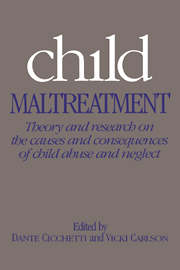Book contents
- Frontmatter
- Contents
- List of contributors
- Preface
- Part I History and definition
- Part II Parental and contextual influences on maltreatment
- Part III The developmental consequences of child maltreatment
- 13 How research on child maltreatment has informed the study of child development: perspectives from developmental psychopathology
- 14 Child maltreatment and attachment theory
- 15 Patterns of maternal behavior among infants at risk for abuse: relations with infant attachment behavior and infant development at 12 months of age
- 16 Finding order in disorganization: lessons from research on maltreated infants' attachments to their caregivers
- 17 Peer relations in maltreated children
- 18 The effects of maltreatment on development during early childhood: recent studies and their theoretical, clinical, and policy implications
- 19 Social cognition in maltreated children
- 20 The effects of maltreatment on the development of young children
- 21 Troubled youth, troubled families: the dynamics of adolescent maltreatment
- 22 Child abuse, delinquency, and violent criminality
- 23 The prevention of maltreatment
- Name index
- Subject index
19 - Social cognition in maltreated children
Published online by Cambridge University Press: 04 May 2010
- Frontmatter
- Contents
- List of contributors
- Preface
- Part I History and definition
- Part II Parental and contextual influences on maltreatment
- Part III The developmental consequences of child maltreatment
- 13 How research on child maltreatment has informed the study of child development: perspectives from developmental psychopathology
- 14 Child maltreatment and attachment theory
- 15 Patterns of maternal behavior among infants at risk for abuse: relations with infant attachment behavior and infant development at 12 months of age
- 16 Finding order in disorganization: lessons from research on maltreated infants' attachments to their caregivers
- 17 Peer relations in maltreated children
- 18 The effects of maltreatment on development during early childhood: recent studies and their theoretical, clinical, and policy implications
- 19 Social cognition in maltreated children
- 20 The effects of maltreatment on the development of young children
- 21 Troubled youth, troubled families: the dynamics of adolescent maltreatment
- 22 Child abuse, delinquency, and violent criminality
- 23 The prevention of maltreatment
- Name index
- Subject index
Summary
There is increasing interest in the psychological consequences of child maltreatment, as evidenced by the recent attention and journal space given to the topic. Most of this research has focused on behavioral effects – such as heightened aggression – or socioemotional effects – such as deficits in the development of empathy. Although research on the development of social cognition in normal children has been burgeoning over the past 15 years, research on the effects of maltreatment on social-cognitive development has been virtually ignored.
In this chapter, we contend that studying the social cognition of maltreated children is important for several reasons. First, it is important to determine how children who have experienced extended social interactions in environments that are abusive or neglectful construct, interpret, and structure their social world. We do not know, for instance, whether and in what ways maltreated children's developing understanding of others' emotions, attributions for others’ behavior, justifications for their own behavior, or moral judgments differ from nonmaltreated children. These represent important but unanswered questions that fall within the social-cognitive realm. Knowledge of normative social-cognitive development can be used to identify deficits or delays in development that are related to experiences of maltreatment.
Second, knowledge of social-cognitive development in maltreated children can compliment and enrich our knowledge by offering unique opportunities to test hypotheses about normative development. Most theories of social-cognitive development are based upon the Piagetian premise of an active child structuring his or her social world through social interactions.
- Type
- Chapter
- Information
- Child MaltreatmentTheory and Research on the Causes and Consequences of Child Abuse and Neglect, pp. 620 - 646Publisher: Cambridge University PressPrint publication year: 1989
- 10
- Cited by



